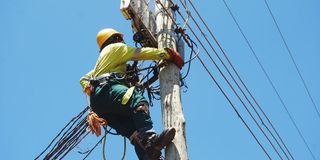Prime
Only 1.7 million households are connected to electricity - ERA

On average, a Ugandan household, according to Uganda Bureau of Statistics, is composed of at least five persons, which means that only 8.5 million Ugandans have access to electricity. PHOTO | FILE
Only 1.7 million out of the eight million Ugandan households are connected to the national electricity grid, according to Electricity Regulatory Authority (ERA).
Speaking during the signing of a Memorandum of Understanding between Uganda National Council for Science and Technology and ERA to jointly promote efficiency and development of skills for electricians in the power supply chain, Ziria Tibalwa Waako, the ERA chief executive officer, said many households still have no access to the electricity grid despite a tremendous increase in generated power.
“Currently, only 1.7 million Ugandan households are connected to the electricity grid out of the targeted 8 million,” she said, noting that there is need to work towards a common vision of increasing electricity consumption.
However, she noted, as government works on improving consumption, there is need to build a good stock of electricians as well as enhancing professionalism to achieve better connections and efficient consumption.
On average, a Ugandan household, according to Uganda Bureau of Statistics, is composed of at least five persons, which means that only 8.5 million Ugandans have access to electricity.
ERA, through a number of partnerships, is seeking to improve the electricity sub sector through skilling, retooling and mindset change programmes for electricians and wire persons.
The regulator is also promoting technological innovation and business incubation for electricians and wiremen, internship and placement mechanisms for exposure for hands-on experience for electricians and wire persons.
Other areas of cooperation include training and certification programmes for electricians and wiremen, joint research and development as well as publicity and community engagement to create visibility of the parties involved in the electricity sub-sector.
Dr Martin Patric Ongol, the UNCST acting executive secretary, said collaborations are important in attainment of professionalism as well as ensuring availability of hands-on training, certification, research and development.
“ERA and UNCST share a common vision and goal to increase the number of certified wire persons,” he said.
Government, through the Uganda National Council for Science and Technology and with support from China is implementing the National Science, Technology, Engineering and Innovation Skills Enhancement Project to enhance participation of Ugandans in strategic national infrastructural projects and manufacturing industries.
The programme also includes establishment of a National Science, Technology, Engineering and Innovation Centre at Rwebiteete village in Kiruhura District with seven engineering majors among them the electrical and electronics hub.
Enhance participation
Government, through the Uganda National Council for Science and Technology and with support from China is implementing the National Science, Technology, Engineering and Innovation Skills Enhancement Project to enhance participation of Ugandans in strategic national infrastructural projects and manufacturing industries.




